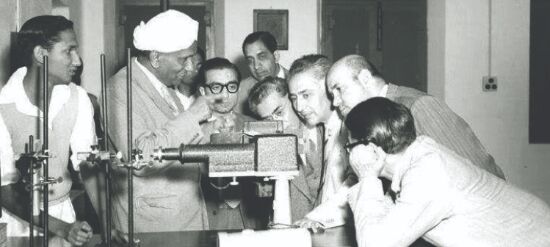The 'Raman' effect
Inspired by his scientific curiosity, NEP 2020 honours the celebrated physicist CV Raman by working to instil newer generations of India with scientific curiosity that is tempered with social responsibility

Dreams are the best part of life. It is not the realization, but the anticipation; I am going to make a discovery tomorrow, that makes a man of science work hard, whether he makes the discovery or not" said Sir CV Raman during the foundation stone laying ceremony of the Community Science Centre, Ahmedabad. He was asked to choose a scientific subject for delivering. With his utter simplicity and curiosity, he said he had no difficulty at all in selecting the topic of discussion i.e. "Why the sky is blue". The spirit of science can be embedded in a student if he keeps his eyes and ears open and looks around the world with curiosity. However, everything is not a subject for interest, but a challenge to the spirit of man to understand something about the vast mystery that surrounds human beings. The younger generation should address each challenge to rebuild India into a global super knowledge power. The students should never be content with his set of knowledge but must look around and ask all sorts of questions; look around the problem and start with the search.
The search will result in the achievement of the truth, but as sir, CV Raman says that you may never achieve the end —and that's the beauty of science. To be a man of science, one needs to feel the urge towards the search for knowledge. The young scientist should always try to find something real and look forward to the acquirement of knowledge. We must remember that the most significant thing in life is not the achievement but the ultimate desire to achieve. The efforts that one puts in leads to the most excellent satisfaction.
Perceiving the dynamic nature of science with its ever-expanding body of knowledge. The curriculum for the 21st century as recommended in the National Education Policy 2020 will be based on the principles of scientific inquiry born out of natural curiosity, logical reasoning and experimentation. The curriculum will also enable the students to become responsible democratic citizens of the country. Thereby, not any more the responsibility of the teacher will be to teach the facts and principles of science but also to support the students such that they can become socially responsible. Students will be encouraged to appreciate how science is affected by multiple facts, including diverse individuals, cultures and society. While saying so, I lay emphasis that there should be a responsible use of science and technology benefiting the society such that we live in harmony with nature. The scientific vision should be embedded about acquiring and processing information, along with nurturing scientific and technological developments hailing its relevance to everyday life and long-term implications to society. Teachers should view their responsibilities in a broader perspective such that students are empowered to make rational choices when faced with various possibilities and challenges. The Higher Education Institutes will be promoting research and innovation among students. National Research Foundation will be established to
help enable and support an innovative and vibrant research culture across higher education institutes, research labs and other research organizations.
Scientific attitude is being developed right from the school age. As an initiation step, the Ministry of Education had launched the Pradhan Mantri Innovative Learning Programme — DHRUV in 2019 to foster identified talented children from across the country. To enrich the skills of these talented and gifted students adequate mentoring will be provided to them such that their skills and knowledge can be enriched. These efforts will help the students to realize their full potential and at the same time contribute to the development of society. Last year, under this Programme, 30 students of Science group and 30 students of Performing Arts group were selected from class 9 to 12. In higher education also, various schemes, namely, Scheme for promotion of Academic and Research Collaboration (SPARC), Impacting Research, Innovation & Technology (IMPRINT), Scheme for Transformational and Advanced Research in the Sciences (STARS), Scheme for Promotion of Academic and Research Collaboration (SPARC), PMRF (PM Research Fellowship) and Scheme for Trans-disciplinary Research for India's Developing Economy (STRIDE).
Fellowship in the name of Sir Raman Fellowship for Post-Doctoral Research for Indian Scholars was launched in 2015. The fellowship will provide a platform for the students to interact with the American academic/scientific community. The students will be acquainted with undertaking developments at the international level with exemplary knowledge about theoretical and scientific research methods to undertake collaborative research projects.
The plethora of these initiatives is based on the fact that knowledge evolves continuously from experiences. Knowledge is constructed through the active process of exchange of ideas, beliefs and reflections with a dynamic interaction of nature. The spirit of scientific attitude will enable us to understand 'Why is the sky blue?' but also foster him to question multiple questions while looking around the problem and start with the quest for knowledge. The student of the 21st century will be an inquisitive blend of detailed thinking with an obstinate genuineness personifying 'Science for Society'.
The writer is the Union Education Minister, Government of India. Views expressed are personal



